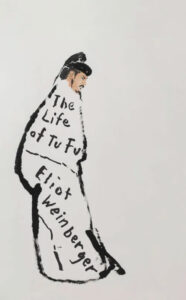
Eliot Weinberger
ISBN : 978-0811238052
New Directions (April, 2024)
64 pages, $13.95, Paper
Reviewed by John Bradley
“This is not a translation of individual poems, but a fictional autobiography of Tu Fu derived and adapted from the thoughts, images, and allusion in the poetry,” explains the author at the back of this intriguing book. Tu Fu, a poet from the Tang Dynasty who lived from 712 to 770, is considered the greatest Chinese poet, and given the distinguished poetic heritage of Chinese poetry, that’s saying something. Tu Fu lived during a tumultuous period, when civil wars dragged on for many years. Millions died. Tu Fu and his family experienced hunger (one child died of starvation) and homelessness, constantly fleeing one shelter for another that promised safety.
But while there are at least a dozen references to war in this book—“There are no men left; they are conscripting boys” (p. 10)—it’s not necessary to know about the life of Tu Fu. Or even, for that matter, his poetry. Weinberger’s 58 untitled short poems, from 2 lines to 13, never refer to specific events in Tu Fu’s life, but rather offer deeply felt observations. “I write about what is happening,” (p. 53) Tu Fu tells us, and that serves as the key to all the poems. Here is an entire poem, illustrating this technique:
Watching the horses being washed,
Listening to the cicadas in the trees.
I write about what is happening:
I record the dawns and sunsets.
I wonder why cherries are all the same size.
If it is not painted perfectly, a tiger will look like a dog. (p. 53)
These six lines appear at first unconnected; they seem a series of non sequiturs, but on rereading, subtle connections appear. The two fragments opening the poem show us “what is happening.” The second stanza employes direct statement and reveals Tu Fu’s methodology. The fifth line shifts to a thought based on Tu Fu’s observation of cherries. The last line, which startles the reader and seems an unlikely way to close a poem, playfully shows us just how closely this poet observes the world. It also shows that Weinberger is a master of juxtaposition.
Weinberger is certainly familiar with classical Chinese poetry, having written Nineteen Ways of Looking at Wang Wei (New Directions, 1987, republished 2016), an insightful examination of one poem by another famous Tang Dynasty poet, Wang Wei. But The Life of Tu Fu offers something quite different from a scholarly work. While steeped in the life and work of Tu Fu, this is original poetry, with Weinberger writing in the persona of Tu Fu: “The rain is crystal. / Rains soaks my clothes.” (p. 26)
One of the ways Weinberger allows us into Tu Fu’s psyche, and how he structures these poems, is to present an observation and follow it with a personal statement. The two lines above illustrate this technique. Here’s another example:
All things do what they do:
Birds swoop to catch an insect.
Moonlight breaks through the forest leaves.
Soldiers guard the border.
I am trapped in this body. (p. 13)
The last line makes an impact not only because of the shift to the “I,” but also the way it breaks the chain of actions, of observing how things “do what they do.” But what is it that Tu Fu does? Whatever it is, he implies he feels unable to fulfill his potential, prevented perhaps by the war from doing what he feels he should or must do.
While Tu Fu may feel a lack of freedom, The Life of Tu Fu leaves the reader feeling the opposite. The brevity of the poems combined with the leaps within the poems ask the reader to fill in what’s unstated. Here is the last poem of the book: “The moon, the river, the boat, an egret, a fish, a splash, a lamp rocking in the wind.” (p. 62) Is this the last thought of Tu Fu as he dies? An unfinished poem? More observations as he continues to wander? Such is the richness of this book that all of the above apply.
Published in Cider Press Review, Volume 26, Issue 2.
See all items about John Bradley
Visit John Bradley’s contributors page.
See all items about Eliot Weinberger
Visit Eliot Weinberger’s contributors page.


 John Bradley’s most recent book of poetry is Everything in Motion, Everything at Rest, from Dos Madres Press. He is the recipient of two NEA Fellowships in Poetry. His reviews of poetry books have appeared in Dispatches from the Poetry Wars, Fifth Wednesday Journal, Rain Taxi, and Sulfur Surrealist Jungle.
John Bradley’s most recent book of poetry is Everything in Motion, Everything at Rest, from Dos Madres Press. He is the recipient of two NEA Fellowships in Poetry. His reviews of poetry books have appeared in Dispatches from the Poetry Wars, Fifth Wednesday Journal, Rain Taxi, and Sulfur Surrealist Jungle. Eliot Weinberger is a contemporary American writer, essayist, editor, and translator. His work regularly appears in translation and has been published in some thirty languages.
Eliot Weinberger is a contemporary American writer, essayist, editor, and translator. His work regularly appears in translation and has been published in some thirty languages.


